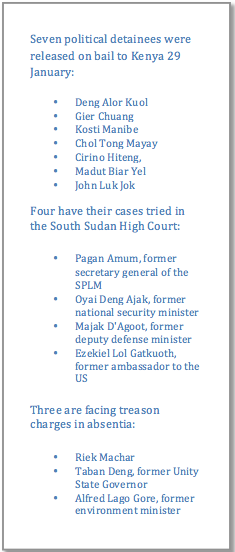While peace negotiations between the SPLM/A and the SPLM/A-in-Opposition have entered a third round in Addis Ababa, the government of South Sudan is in the process of putting several of South Sudan’s most prominent politicians on trial. The court case is highly politicised and inextricably linked to the struggle for power in South Sudan.
 Shortly after the outbreak of violence 15 December lastyear the South Sudan government detained eleven politicians accused of involvement in a coup attempt. Their detention has been a crucial issue in previous rounds of the peace negotiations (see previous brief). In late January seven detainees were released on bail, but the trial of the other four commenced last week. Pagan Amum, Oyai Deng, Majak D’Agoot and Lol Gatkuoth are all charged under the Penal Code Act of 2008, chapter five, with “treason, incitement of the masses, causing disaffection among police forces or defense forces, defaming the government of South Sudan and undermining authority of or insulting the president.” Conviction on some of these charges carries a maximum penalty of death.
Shortly after the outbreak of violence 15 December lastyear the South Sudan government detained eleven politicians accused of involvement in a coup attempt. Their detention has been a crucial issue in previous rounds of the peace negotiations (see previous brief). In late January seven detainees were released on bail, but the trial of the other four commenced last week. Pagan Amum, Oyai Deng, Majak D’Agoot and Lol Gatkuoth are all charged under the Penal Code Act of 2008, chapter five, with “treason, incitement of the masses, causing disaffection among police forces or defense forces, defaming the government of South Sudan and undermining authority of or insulting the president.” Conviction on some of these charges carries a maximum penalty of death.
In addition to correspondence and phone recordings, the main evidence against the politicians is statements made at a press conference on 6 December 2013. Witnesses have also given statements, but not without surprises. Army Brigadier General Atem Benjamin summoned by the prosecution ended up supporting the defendants’ claim of innocence, while Minister of Interior Aleu Ayeny Aleu failed to appear in court despite several summons.
Although important in itself, the trial has wide-reaching political implications, not only for the legitimacy of the current rebellion, but also for that of the new South Sudanese state. Implicitly, this is a trial to determine blame for the outbreak of violence in Juba on 15-18 December, which escalated into today’s state of civil war. Given the high stakes and politicised nature of the trial, it is likely that no definite conclusion will be reached on the issue of coup plotting. Both sides now appear to agree that the arrest of the opposition leaders happened at the same time that violence broke out and that resistance to the arrest led to further violence. They diverge over whether the arrests were justified. In consequence, the events of 15-18 December seem not to be part of the charge. Instead, prosecutors contend that the politicians were plotting a coup before 15 December and were arrested pre-emptively. A conviction would legitimise the arrests, shift blame for the ensuing violence onto the opposition, and win back some of the support the government has lost both domestically and internationally. The opposition claims that the arrests were intended to neutralise unruly factions within the SPLM. Moreover, the four accused did not resist arrest: the attempt to apprehend Riek Machar (who escaped) – is what caused more violence.
At the time of the arrests, Salva Kiir had been openly challenged by the internal opposition, who demanded that he step down. On 6 December they announced plans for a demonstration at the John Garang Memorial Site – the place for official rallies in Juba. The government’s decision to hold a long delayed National Liberation Council meeting on 13 -14 December was a hasty response that failed to placate the opposition, who walked out on the first day. The arrests thus took place during a political fight with careers, lives, and ultimately the future of South Sudan at stake.
In sum, it is the timing of the trial that is problematic. Atrocities have been committed in South Sudan and trials might be warranted, but holding them in the midst of a civil war and parallel to peace negotiations will be counter-productive. A more sensible approach has been recommended by David Deng of the South Sudan Law Society, the Enough Project and members of the US Congress: a hybrid court combining South Sudanese and foreign judicial expertise. But delay would create a dilemma for the government: they either have to keep the four detainees under arrest indefinitely or release them on bail and suffer a severe loss of prestige.
Øystein H. Rolandsen, Senior Researcher PRIO, and Helene Molteberg Glomnes, Research Assistant, PRIO.
Reblogged this on PaanLuel Wël: South Sudanese Bloggers..